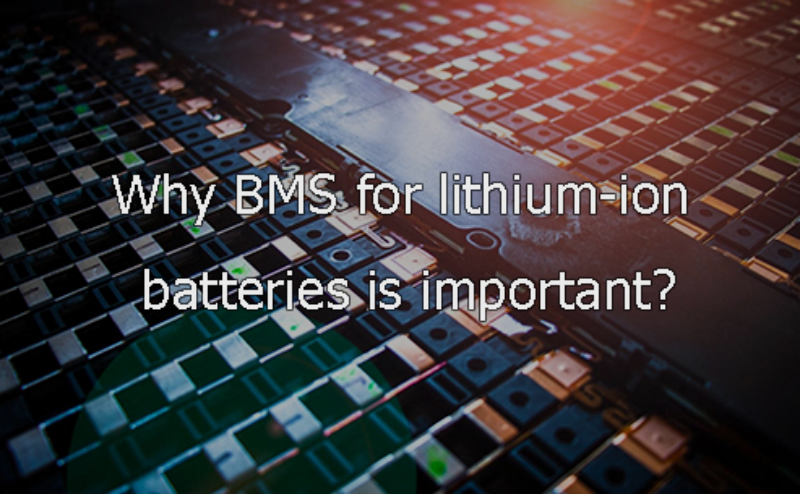
Main content:
- What is the BMS for lithium ion battery?
- How does a BMS for lithium-ion battery work? Does BMS stop overcharging?
- Do you need a BMS for a lithium-ion battery? Why do lithium-ion batteries need BMS?
- How many types of BMS for lithium-ion batteries are there?
- Do all lithium-ion batteries have BMS? Are all BMS for lithium-ion batteries the same?
- What happens if a BMS for lithium-ion battery fails?
- What causes BMS failure?
- The whole system does not work after the system is powered on
- SOC is abnormal
- The temperature difference of the battery is too large
- How do you reset a BMS for lithium-ion battery?
In recent years, with the rapid development of new energy vehicles and electrochemical energy storage industry, the scale and energy density of energy storage systems are increasing day by day. Lithium batteries with high battery capacity are increasingly used by users and industry and commerce, especially in energy storage industry. Taking advantage of the intensive tuyere of policies, the scale of energy storage projects shows an explosive growth trend. However, this is not just an opportunity for the industry, there are also battery safety issues.
With the rapid rise of energy storage market, energy storage safety accidents are common. According to rough statistics, up to now, there have been more than 50 energy storage system fire accidents in the world. The safety of electrochemical energy storage has been affecting the nerves of the public and users. Thermal management of Li-ion batteries largely affects the efficiency and safety of energy storage systems.
In essence, thermal management of lithium-ion batteries is to prevent phenomena such as burning or explosion that may occur when the battery temperature reaches a certain limit. Battery overheating, overcharge, internal short circuit, collision, etc. are all key factors that lead to the "thermal runaway" of the battery, and also seriously affect the performance of the battery. The BMS for lithium ion battery is specially designed to protect the safety of the battery, which can effectively avoid overheating, overcharging, overdischarging, and overtemperature. Therefore, in large-scale lithium battery applications, the application of battery protection and battery management systems (BMS) is crucial.
1.What is the BMS for lithium ion battery?
BMS stands for Battery Management System. It is a a core technology of the internal control system inside the battery pack, generally consisting of one or more electronic controllers. The system is responsible for controlling and managing the charge/discharge of the battery, detecting the temperature and voltage of the battery, balancing the battery voltage, and managing the safety performance of the battery pack. It is an important link between the battery and the electric appliance.
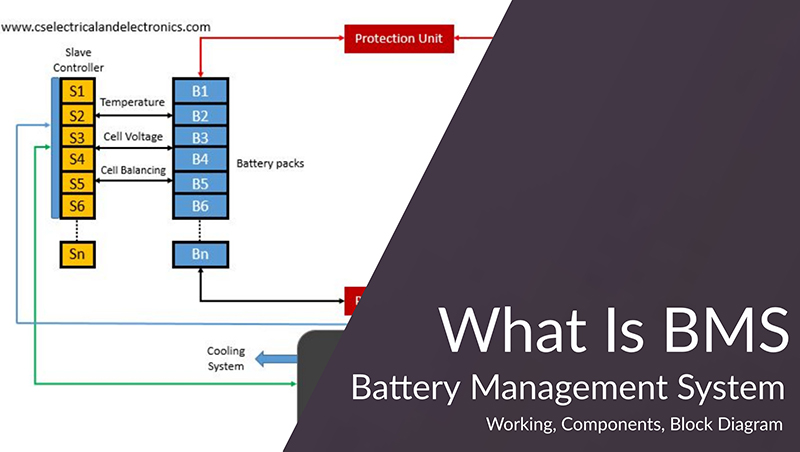
As the monitoring and management center of the battery pack, it must conduct real-time dynamic detection of the temperature, voltage, charge and discharge current and other related parameters of the battery pack. When necessary, it can take the initiative to take emergency measures to protect battery cells and prevent the battery pack from hazards such as overcharge, overdischarge, overheating and short circuit. Lithium-ion batteries are superior to others on the market in that they charge faster, perform better and last longer.
However, in the actual use of the process, it is easy to overcharge the battery due to improper management, and then prone to thermal runaway, resulting in safety accidents. Therefore, regular lithium-ion battery products will be equipped with BMS to avoid these problems. Due to the existence of BMS, lithium-ion batteries can be regarded as perfect battery products in all aspects, which can not only provide high-performance and stable power supply for our equipment and applications, but also avoid thermal runaway and other power safety problems.
2.How does a BMS for lithium-ion battery work? Does BMS stop overcharging?
BMS for lithium ion battery includes control IC, MOS switch, resistor, capacitor and auxiliary devices such as FUSE, PTC, NTC, ID, memory, etc. Among them, the control IC controls the conduction of the MOS switch under normal conditions, so that the cell and the external circuit are connected. When the cell voltage or loop current exceeds the specified value, immediately control the MOS switch to turn off to protect the cell.
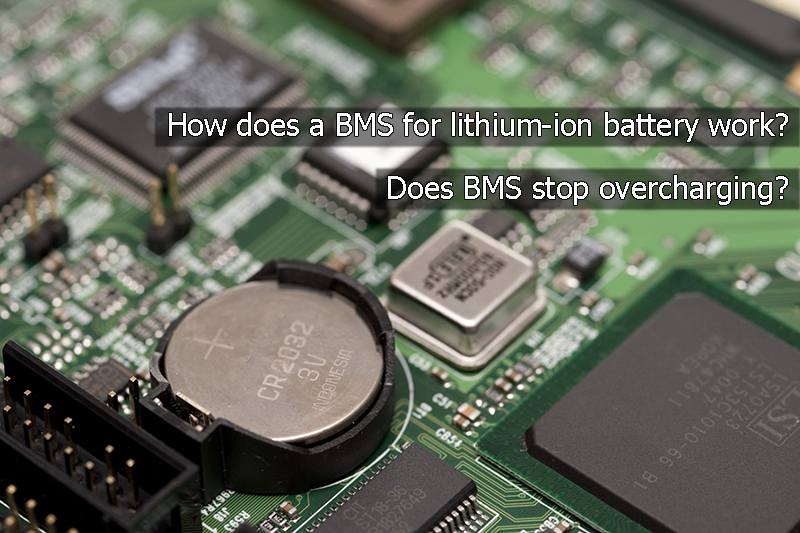
BMS for lithium ion battery is responsible for keeping the battery at optimum temperature and voltage. Whereas battery being overcharged and overuse can cause damage or heating issues. So BMS for lithium ion battery help avoid overcharging, and BMS for lithium ion battery is customizable, generally adding Bluetooth, LCD screen, and APP link functions to it, which can provide users with real-time battery information.
3.Do you need a BMS for a lithium-ion battery? Why do lithium-ion batteries need BMS?
Yes, you do need BMS for a lithium ion battery. In practical applications, the individual cells inside the battery pack are prone to uneven heat dissipation or excessive charge and discharge. Over time, these batteries in poor working conditions are likely to be damaged in advance, and the overall life of the battery pack will be greatly shortened. Not only that, the battery is in a serious overcharged state and there is a danger of explosion, which not only damages the battery pack, but also threatens the safety of the user's life. Therefore, a set of targeted battery management system must be equipped for a lithium ion battery pack, so as to effectively monitor, protect, balance the energy and alarm the failure of the battery pack and further improving the working efficiency and service life of the entire battery pack.
4.How many types of BMS for lithium-ion batteries are there?
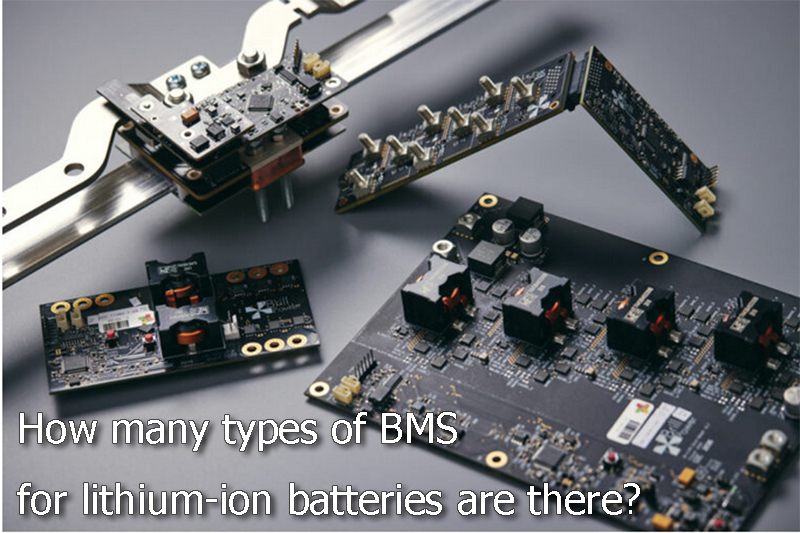
Generally speaking, BMS for lithium ion battery is composed of the master control module and the acquisition module (or slave control module). Individual voltage collection, temperature collection and balancing functions are generally allocated to the slave control module, while the collection of total voltage and total current, internal and external communication, fault recording and fault decision-making are all functions of the master control module. BMS can be divided into centralized and distributed according to the different distribution and arrangement of acquisition module and main control module in entity.
① Centralized battery management systems
Centralized battery management systems is a centrally controlled pack that doesn't require any external power the working. It is all a single unit from which wire harness goes to batteries. The board is centralized and consists of multiple analog Digital convertors channels. The cell monitoring circuit in the board is responsible for the communication, fetching the data from the cells and analyzing it according to the need of the battery regarding voltage and temperature. The hardware of a centralized battery management system can be divided into high voltage and low voltage regions.
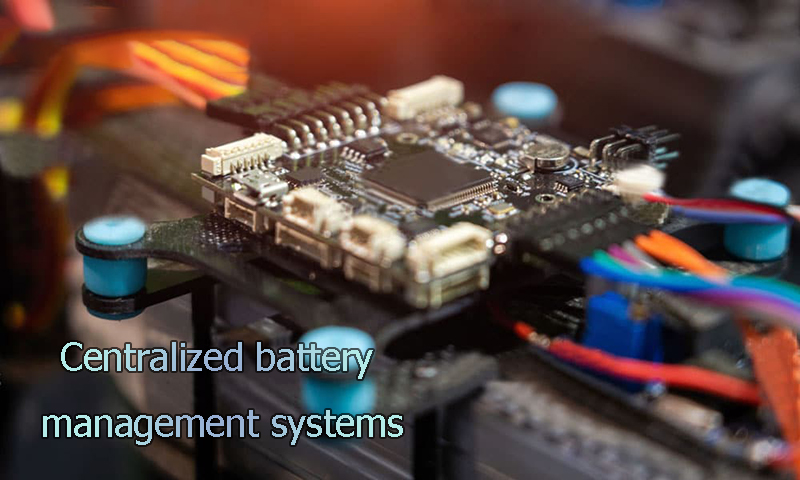
The high-voltage area is responsible for collecting the voltage of individual batteries, collecting the total voltage of the system, and monitoring insulation resistance. The low-voltage area includes power supply circuit, CPU circuit, CAN communication circuit, control circuit and so on. It has the advantages of low cost, compact structure, and high reliability. It is generally used in scenarios with low capacity, low total voltage, and small battery system volume, such as electric forklifts, electric golf carts, etc.
② Decentralized battery management systems
Decentralized battery management systems can better implement hierarchical management of module level (Module) and system level (Pack). The slave control unit CSC is responsible for voltage detection, temperature detection, balance management (some have independent CSU module units) and corresponding diagnostic work for the monomers in the Module. The high voltage management unit (HVU) is responsible for the pack's battery. The total voltage, total bus voltage, insulation resistance and other states are monitored (the bus current can be collected by Hall sensors or shunts).
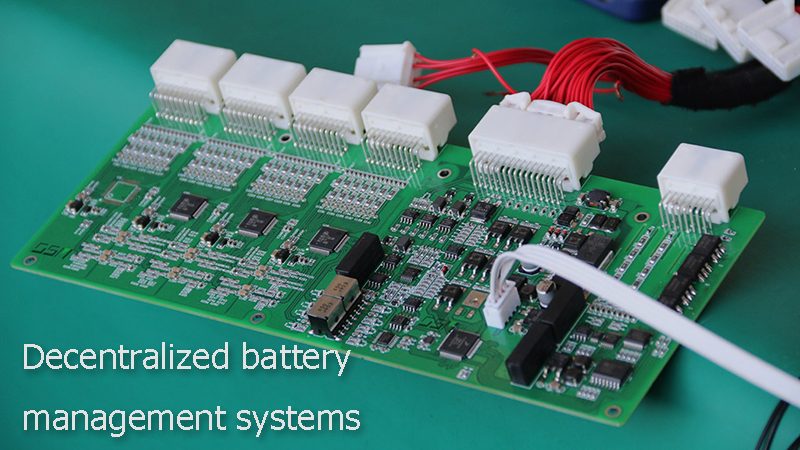
And the CSC and HVU send the analyzed data to the main control unit BMU (Battery Manangement Unit), and the BMU Carry out battery system BSE (Battery State Estimate) evaluation, electrical system state detection, contactor management, thermal management, operation management, charging management, diagnosis management, and management of internal and external communication networks. Its advantage is that it can be efficiently configured according to different battery system series-parallel designs, the wiring harness distance between the BMS and the battery is shorter, more uniform, and more reliable, and it can also support larger battery system designs.
5.Do all lithium-ion batteries have BMS? Are all BMS for lithium-ion batteries the same?
Not all lithium-ion batteries have BMS, and these lithium-ion batteries are often made by informal manufacturers, posing great safety risks. Even if some lithium-ion batteries are equipped with BMS, they are highly likely to explode and burn due to the use of inferior protection plates. However, regular manufacturers will be equipped with lithium battery BMS in line with safety regulations, such as TYCORUN BATTERY, a reliable Lithium Iron Phosphate Batteries Store.
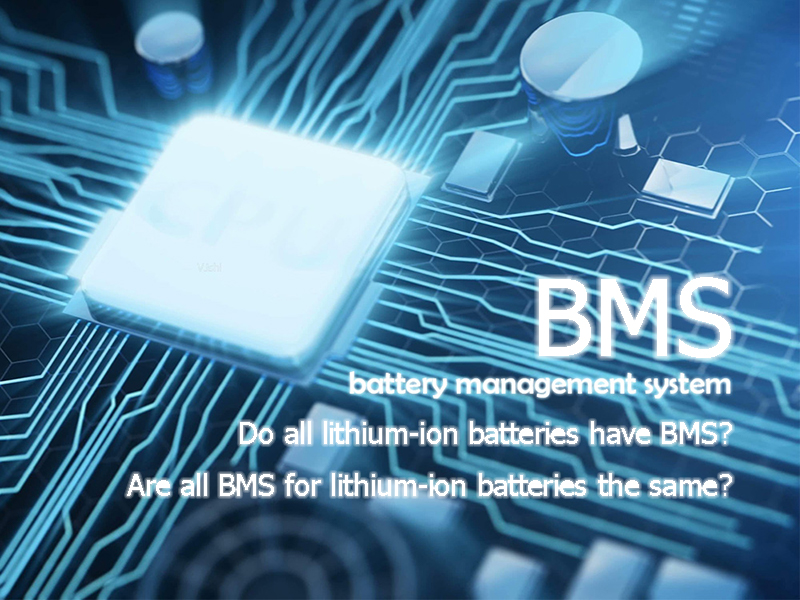
The main raw materials they use are certified by the national quality certification, and the product quality is more guaranteed after passing the test. It’s essential to have a BMS for lithium-ion batteries as it protects the battery reliability, high-performance, long-life span, and protects the battery from damage. It monitors the battery voltage and temperature and keeps the load as required. All battery system has different BMS for lithium ion battery. So BMS for lithium ion battery is customized for each situation as required.
6.What happens if a BMS for lithium-ion battery fails?
If BMS for lithium-ion batteries fails, it can cause the batteries to overcharge and over-discharge. Because the voltage or the temperature will not be detected correctly or the communication between board/wires/cells/ will be faulty, which will disrupt the function of BMS for lithium ion battery, causing it to be overheating. In other words. If the volt detection is defective, it will go overcharge and over-discharge. If the temperature detection is faulty, it will overheat, which might damage the battery. And if there's any miscommunication, then any reaction can occur.
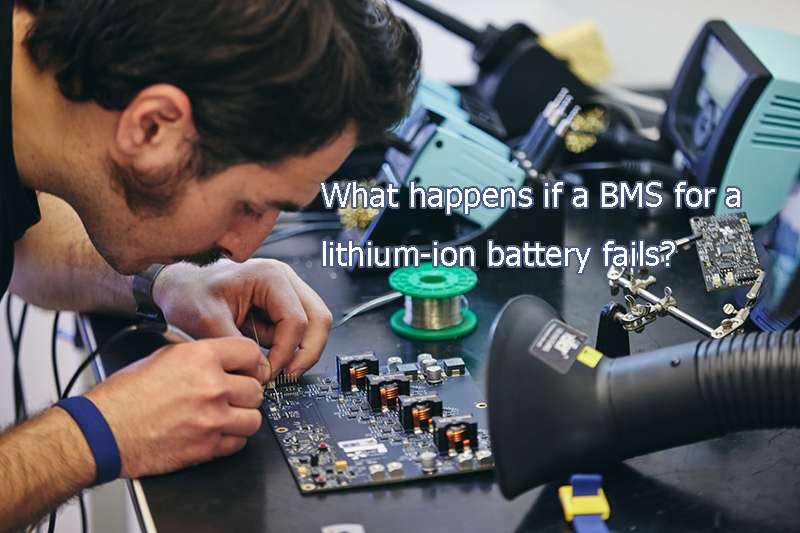
7.What causes BMS failure?
There are many reasons for the failure of BMS for lithium-ion batteries, common faults of BMS can be roughly divided into the following types:
① The whole system does not work after the system is powered on
The reasons for this may be abnormal power supply, short circuit or open circuit of wiring harness, and no voltage output of DCDC. At this point, you can troubleshoot potential faults You can troubleshoot by checking them one by one, and then make the BMS back to normal.
② SOC is abnormal
The phenomenon of abnormal SOC is that the SOC changes greatly during the system operation, or jumps repeatedly between several values. SOC has a large deviation during the charging and discharging process of the system. And the SOC always shows a fixed value.The possible reasons for these phenomena are that the current is not calibrated, the model of the current sensor does not match the host program, the battery has not been deeply charged and discharged for a long time, and the data acquisition module has a jump in acquisition, resulting in automatic calibration of the SOC or failure of the Hall sensor.
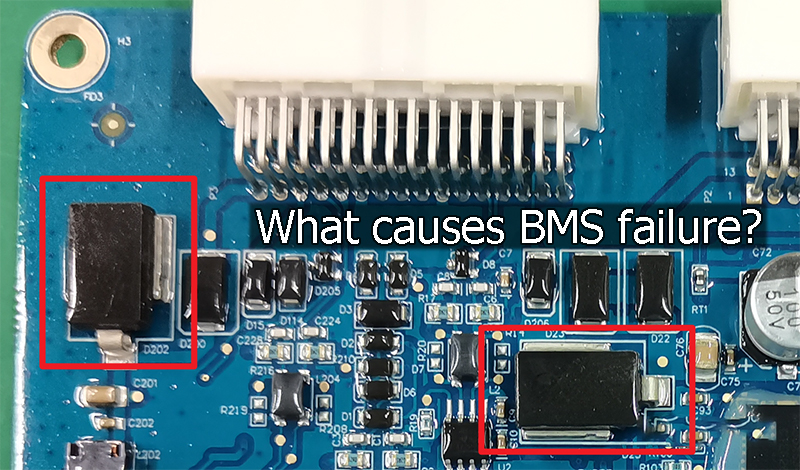
③ The temperature difference of the battery is too large
The possible reasons for this failure are loose cooling fan plug, failure of cooling fan, failure of cooling liquid, and cold zone system not starting. You can troubleshoot by re-plugging the fan plug, powering the fan separately, checking if the fan is normal, changing the coolant, and checking the cooling system.
8.How do you reset a BMS for lithium-ion battery?
To reset a BMS for lithium ion battery are two different common ways. Either there will be a button or option in the setting to reset the BMS for the lithium-ion battery automatically, or you have open the BMS for lithium ion battery and do it manually by disconnecting the harnessing wires from the BMS for lithium ion battery. These methods are standard in almost all of the BMS for lithium ion batteries.
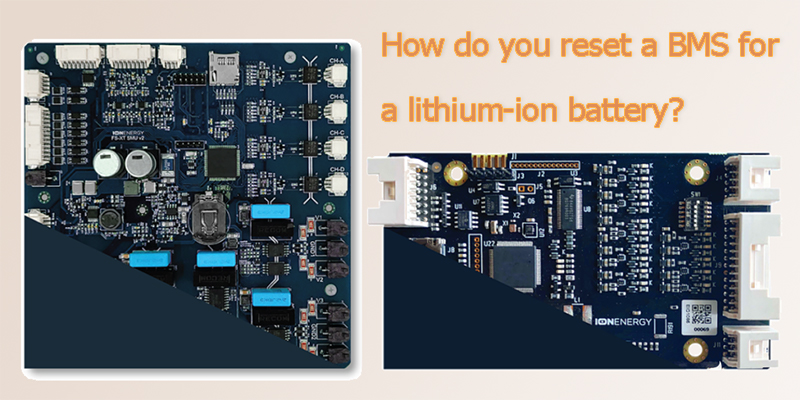
There are several other ways, but it differs for every BMS for a lithium-ion battery. Another reliable method is to troubleshoot the BMS for the lithium-ion battery as instructed by the manufacturer's customer service. This will be reliable as the expert will be handling your BMS for the lithium ion battery, alternative treatments are not recommended as they may not be safe and can damage a part of the whole BMS for lithium ion battery at once.
As the first layer of protection for lithium batteries, BMS is an essential part, but inferior BMS for lithium ion battery cannot play this role, only qualified products can meet safety demands. Regular manufacturers will provide you with products of high quality and professional support. If you want to choose the best lithium batteries, you should opt a superior lithium batteries store. TYCORUN ENERGY is undoubtedly your best choice, our products have passed the national quality certification and passed the test.